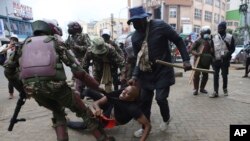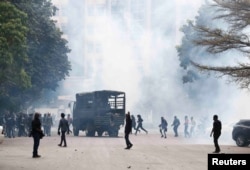Police in Kenya used tear gas against protesters in Nairobi on Thursday, as President William Ruto introduced his new Cabinet.
The demonstrations, led by activists calling for Ruto’s resignation, continued despite his recent Cabinet changes and the removal of planned tax increases.
The Nane Nane march, named after the number eight in Swahili and occurring on August 8, follows weeks of protests that began peacefully in June but later turned violent. The unrest started over a controversial tax proposal that would increase taxes amid high living costs.
Protesters stormed parliament on June 25 as its members voted to pass the bill, which was subsequently rejected by Ruto.
The Kenya National Commission on Human Rights says that more than 50 people have died since the protests began.
On Thursday, many businesses in Nairobi were closed, and public transport was disrupted. Police set up roadblocks and used tear gas to drive protesters out of the city’s financial district.
Some protesters shouted “Ruto must go” during clashes with riot police, according to Reuters.
Ruto responded to the protests by firing most of his Cabinet last month, keeping only the foreign minister. He then added opposition members to his Cabinet, but activists criticized the action as a corrupt move and continued to call for his resignation.
They also demand more reforms to fight corruption and improve public services.
Ruto defended his new Cabinet, saying it shows national unity and will meet the demands of protesters. He has promised to look into complaints about police behavior during the protests but generally supports their actions.
Ruto urged Kenyans to wait until the 2027 elections for change, stressing his commitment to the rule of law.
The protests, organized mostly online and without official leaders, have caused varying levels of disruption across major cities. Civil society groups and the Law Society of Kenya have called for respect for human rights during protests and urged police to avoid using unmarked vehicles and non-uniformed officers.
Other youth protests
Over the past two weeks, protests have also occurred against corruption in Uganda and the high cost of living in Nigeria.
McDonald Lewanika, the head of Accountability Hub East and Southern Africa, an organization that promotes good governance for Africa, said young Africans are generally unhappy with their governments and others managing their countries.
"One thing that is certain is that African young people are mad," Lewanika said, "They are angry, they are dissatisfied. And in that dissatisfaction and anger, they are not calling for anything that is not justly deserved by them. They are asking their leaders to do better. They are asking their leaders to change. They are asking their leaders to govern in their interests as the vast majority of the people of Africa. So there is a significant amount of anger in relation to the inability of our governments to deliver what they should be delivering as governments and also to govern properly."
Afrobarometer, a pan-African research network, surveyed 39 African countries from 2021 to 2023 and found that Africans overwhelmingly see their governments as failing and that those leading them are becoming less trustworthy to run the affairs of state.
Some experts say the age gap between the young population and the elderly presidents of many countries is contributing to anger in the streets, as the leaders sometimes impose economic and political policies that do little for the average person, leaving voters feeling frustrated and hopeless.
Focusing on issues
Lewanika said African youth movements need to push on common agendas that do not create division.
"The moment we start talking about changing people, then that in itself is the terrain for division, that in itself is a terrain for hijacking of movements by people who are interested in capturing power," he said. "I think that what young people's movements need to do is to remain pure and committed to the issues, because the issues see no political color."
Ruto admitted Thursday that there was a disconnect between the public and those in the government.
"It's true and I freely admit due to suboptimal communication of our development agenda and a feeling of insufficient public engagement, we have lost many opportunities to walk the journey of transforming Kenya with everyone aboard, leaving some citizens unable to connect with the policies, programs and projects that have been rolled out throughout our country," he said.
Africans view protests as a last resort to get the attention of officials and government institutions that favor the ruling class. Experts warn that more protests may follow if African leaders do not address the needs of their young citizens.
Mohammed Yusuf contributed to this report from Nairobi. Some information came from The Associated Press and Reuters.






